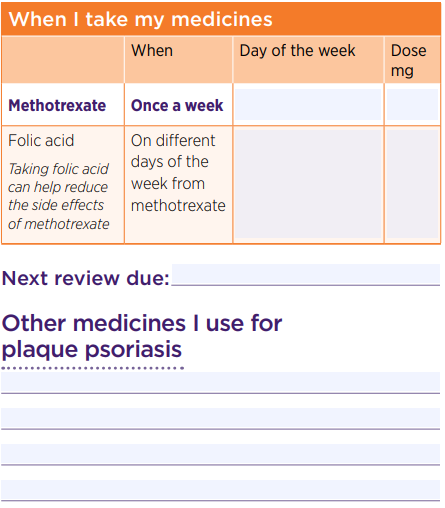Low-dose methotrexate for plaque psoriasis
Plaque psoriasis is an autoimmune condition that affects your skin. While it can’t be cured, many people with plaque psoriasis find that their symptoms can be well controlled with the right treatment. Methotrexate is a medicine used in low doses to treat plaque psoriasis. Use this action plan to discuss methotrexate with your dermatologist. It can help you understand the benefits and risks, as well as the need for monitoring and checks.
Methotrexate acts to control the disease
Methotrexate doesn’t just work on the surface of your skin like topical treatments (eg, creams, ointments and lotions). It works by interrupting the overactive immune system that causes psoriasis.
This slows down the growth of skin cells and reduces inflammation.
| Methotrexate | |
|---|---|
|
|
|
|
Focus on facts
Myths about methotrexate can be barriers to treatment. Knowing the facts helps people stick to their treatment and improves results.
| Fact | Fact | Fact | Fact |
|---|---|---|---|
| Methotrexate for plaque psoriasis is used safely and effectively at low doses – it’s not considered chemotherapy at these doses. | Methotrexate takes time to work – you might not notice an improvement in your skin for 6–12 weeks. | Methotrexate injections can be safely given by yourself, or a family member or friend. | People taking methotrexate for plaque psoriasis can safely make physical contact with pregnant women. |
| Myth | Myth | Myth | Myth |
| Low-dose methotrexate is chemotherapy. | You will notice the benefits of methotrexate straight away. | Giving yourself methotrexate injections is unsafe. | People taking methotrexate cannot be near pregnant women. |
Ongoing care
Blood tests
Regular blood tests are used to check treatment is working and monitor for side effects, measuring kidney and liver function, and doing full blood count. Over time, these tests are needed less often.
Clinical review
Continue regular reviews of your plaque psoriasis with your prescribing doctor. How often depends on how active the disease is.
Vaccinations
Keep your pneumococcal and influenza vaccinations up to date.
Skin checks
Methotrexate can slightly increase the risk of some forms of skin cancer. Annual skin checks are recommended.
Reproductive health
You should seek specialist advice if you plan to have children.
Women should use birth control while taking methotrexate, stop methotrexate 3 months before planning a pregnancy, and avoid breastfeeding while on methotrexate.
Taking low-dose methotrexate
Share this action plan with your healthcare team to help you achieve your treatment goals.

Side effects of methotrexate
Like all medicines, methotrexate may cause side effects.
Most common side effects include:
- nausea, vomiting, diarrhoea
- mouth ulcers
- tiredness, headache and feeling foggy
- increased skin sensitivity to the sun.
Talk to your doctor if you are concerned. Side effects may be reduced by taking methotrexate with food or in the evening.
When to contact my doctor
Further information
NPS MedicineWise (nps.org.au/dermatology-consumers)
Download the MedicineWise app to keep track of your medicines and access health information such as blood test results.
NPS Medicines Line: 1300 633 424
Download the original pdf of this article
Back to Plaque psoriasis hub.
